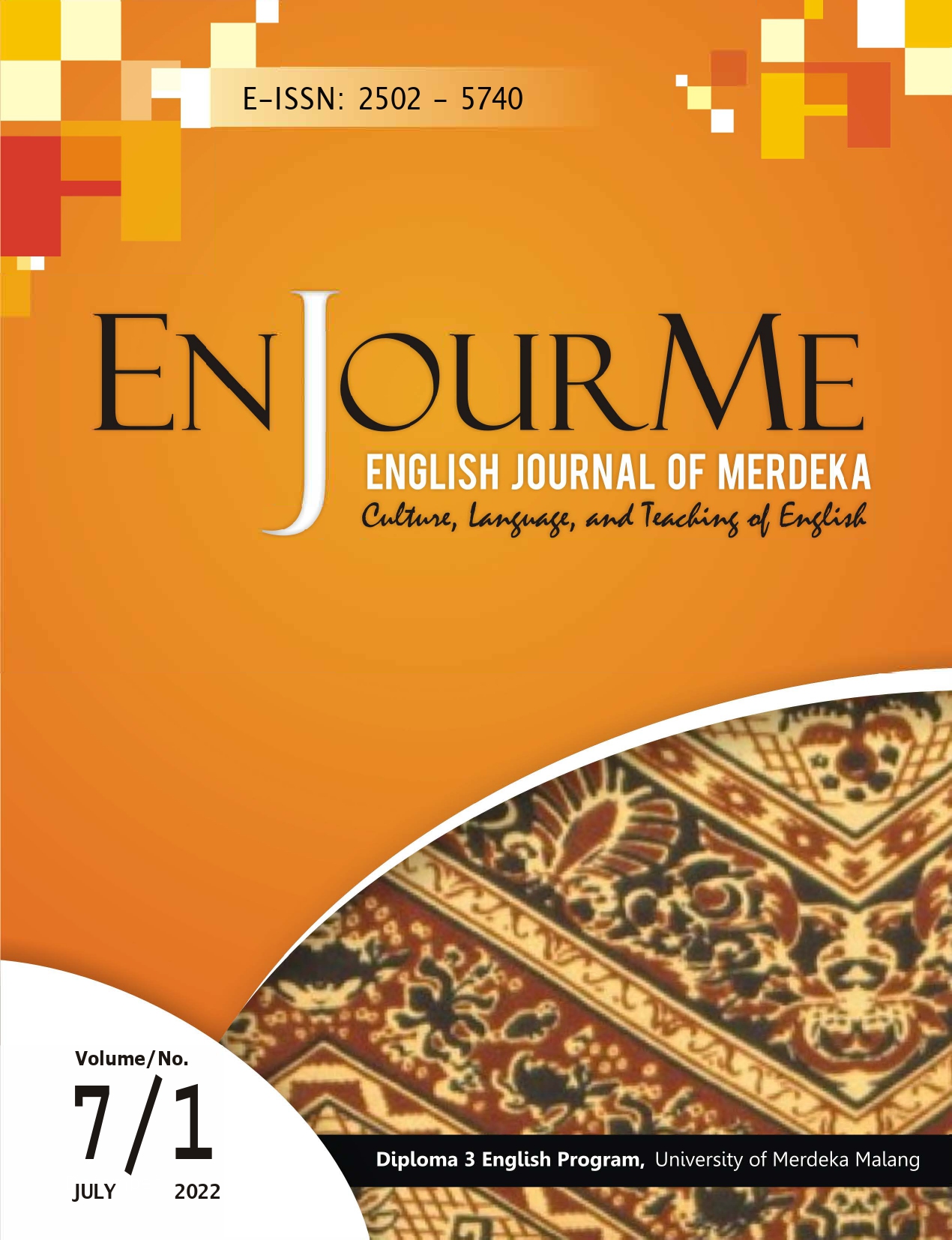English language teaching practices at the tertiary level of Bangladesh: A public university alumni’s feedback
DOI:
https://doi.org/10.26905/enjourme.v7i1.8074Keywords:
Challenges, English, Modifications, Problems, Teaching, UniversitiesAbstract
This study aims at exploring the problems and challenges faced by the students in the long English language teaching practices of the Department of English, Islamic University, Bangladesh, and the achievable modifications recommended by its alumni to ensure pragmatic English language teaching at the universities of Bangladesh. Both qualitative and quantitative or mixed-method approach was applied and a total of 21 alumni of various academic years from 2010 to 2022 (12 Years) of the Department of English at Islamic University, Bangladesh participated in the study. The findings of the study revealed that majority of the participants, after completing the graduation and post-graduation in English, failed to develop their English language skills at the advanced level due to the lack of some crucial issues, like particular course and test on specific skills (Speaking, Listening, Reading, and Writing), effective course design and teaching approach, learner-expected professional dedication of the English language teachers, practice and feedback session, and the use of technological devices in the language classroom and language lab in the English language teaching practices. The study suggests that at least one particular course and test for each English language skills and more practice-oriented ELT courses should be added to the syllabus, and the language teachers should be more serious concerning course design, class activities, effective testing, feedback, use of technology-based classroom, blended learning approach, group discussion and implementation of specific as well as experience-based teaching approach to English language teaching.
Â
Â
DOI: 10.26905/enjourme.v7i1.8074
Â
Downloads
References
Alam, F. (2001). The Dhaka University English curriculum: A decade of development. In Fakrul Alam, Niaz Zaman and Tahmina Ahmed (eds.). Revisioning English Bangladesh. Dhaka: The University Press Limited, pp. 1-14.
Amin, M. (2019). The teaching situation of the department of English in the universities of Bangladesh: a critical evaluation. LEKSIKA Journal, 13, 18-28.
Chowdhury, M.R. (2001). ‘To west or not to west? The question of culture in adopting/adapting CLT in Bangladesh’, Journal of the Asiatic Society of Bangladesh, 46(1): 183–194
Desai, S. C., Reimers, S. (2019). Comparing the use of open and closed questions for Web-based measures of the continued-influence effect. Behav Res 51, pp. 1426–1440. https://doi.org/10.3758/s13428-018-1066-z
Farooqui, S. (2007). Developing Speaking skills of adult learners in Private Universities in Bangladesh: Problems and solutions. Australian Journal of Adult Learning, 47(1), 94-110.https://search.informit.org/doi/10.3316/ielapa.147305991790360
Gach, N. (2020). From totalitarianism to democracy: Building learner autonomy in Ukrainian higher education. Issues in Educational Research, 30(2), 532-554.
Hasan, M. M. (2020). Using various assessment and feedback tools for teaching English at the undergraduate level in Bangladesh. International Journal of Science and Business, 4(1), 214–227. https://doi.org/10.5281/zenodo.3703145.
Haq, M. (2014). A comparative analysis of qualitative and quantitative research methods and a justification for use of mixed methods in social research. Annual PhD Conference, University of Bradford School of Management. June 2014.
Hinkel, E. (2006). Current perspectives on teaching the four skills. Tesol Quarterly, 40(1), 109-131.
Horton, M. (2021). Simple random sample: Advantages and disadvantages. Investopedia. Retrieved from: https://www.investopedia.com/ask/answers/042815/what-are-disadvantages-using-simple-random-sample-approximate-larger-population.asp
Hossain, M. M., & Mustapha, S. M. B. (2020). The relationship between learner autonomy readiness and English language performance of undergraduates at public universities in Bangladesh. Journal of Education and Social Sciences, 16(1), 82-92.
Hyman, M. R., Sierra, J. J. (2016). Open- versus close-ended survey questions. Business Outlook, 14 (2), pp. 1-5.
Islam, M.S., & Stapa, M.B. Students’ low proficiency in spoken English in private universities in Bangladesh: reasons and remedies. Lang Test Asia 11, 22 (2021). https://doi.org/10.1186/s40468-021-00139-0
Islam, M. S., Hasan, M. K., Sultana, S., Karim, A., & Rahman, M. M. (2021). English language assessment in Bangladesh today: principles, practices, and problems. Language Testing in Asia, 11(1), 1-21.
Kabir, M. H. (2011). Backwash effects of examinations upon teaching and learning of English. Horizon, 4, 121–142.
Miller, L., & Aldred, D. (2000). Student teachers’ perceptions about communicative language teaching methods. RELC Journal, 31(1), 1–22. https://doi.org/10.1177/003368820003100101
Obaidul Hamid, M. (2010). Globalisation, English for everyone and English teacher capacity: Language policy discourses and realities in Bangladesh. Current Issues in Language Planning, 11(4), 289–310. doi:10.1080/14664208.2011.532621
O'Cathain, A., Murphy, E., & Nicholl, J. (2007). Why, and how, mixed methods research is undertaken in health services research in England: a mixed methods study. BMC health services research, 7, 85. https://doi.org/10.1186/1472-6963-7-85
Rahman, F., Babu, R., & Ashrafuzzaman, M. (2011). Assessment and feedback practices in the English language classroom. Journal of NELTA, 16, 1–2.
Sandelowski, M., Voils, C. I., & Knafl, G. (2009). On Quantitizing. Journal of mixed methods research, 3 (3), pp. 208–222. https://doi.org/10.1177/1558689809334210
Shumin, K. (2002). in Richards, J.C. & Renandya, W.A (eds.), Methodology in language teaching: An anthology of current practices, Cambridge: Cambridge University Press, 201–211.
Srnka, K.J., Koeszegi, S.T. (2007). From words to numbers: How to transform qualitative data into meaningful quantitative results. Schmalenbach Bus Rev, 59, pp. 29–57. https://doi.org/10.1007/BF03396741
Tsang, E. S. (1999). Resistance to self-access learning. In Morrison, B. J. (Ed.), Experiments and evaluation in self-access language learning (25-42). Hong Kong: HASALD.
Additional Files
Published
How to Cite
Issue
Section
License
Authors who publish with this journal agree to the following terms:
(1) Copyright of the published articles will be transferred to the journal as the publisher of the manuscripts. Therefore, the author confirms that the copyright has been managed by the journal.
(2) Publisher of EnJourMe (English Journal of Merdeka) : Culture, Language, and Teaching of English is University of Merdeka Malang.
(3) The copyright follows Creative Commons Attribution–ShareAlike License (CC BY SA): This license allows to Share — copy and redistribute the material in any medium or format, Adapt — remix, transform, and build upon the material, for any purpose, even commercially.




